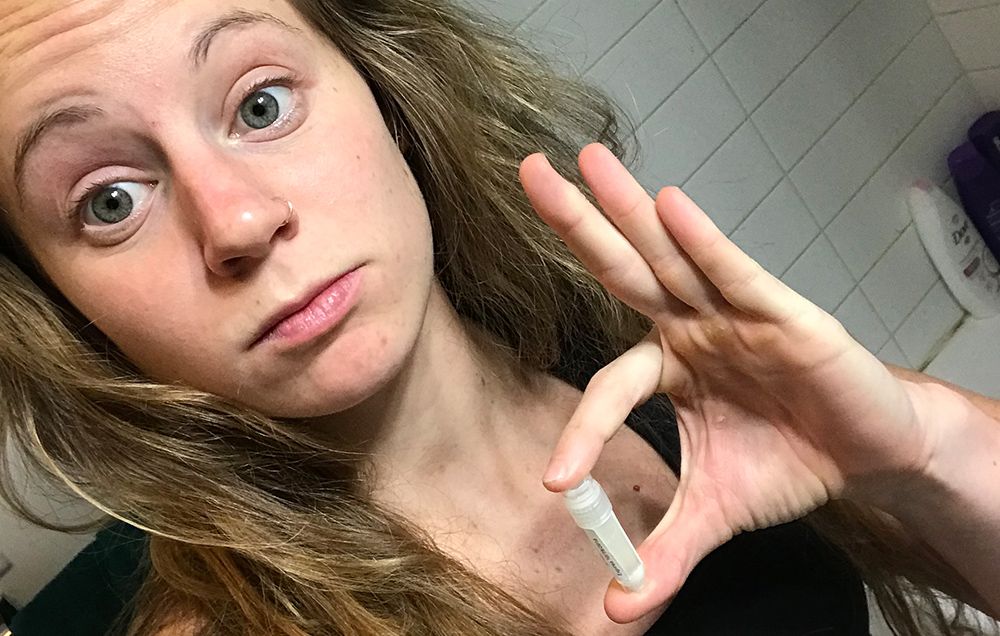What Are The Symptoms Of Anal Chlamydia?

You’re probably aware that STDs can and do happen, and that you want to do your best to avoid them. But while you’ve been monitoring what’s happening in and around your vagina, you might be missing another area where you could get an STD: your butt.
Yep, you can actually get STDs—a.k.a. sexually transmitted infections or STIs—in your anus and rectum. (Quick biology recap: Your anus is the opening at the lower end of your intestines; your rectum is the last several inches of your intestine closest to your anus.)
But what? How? “We’re now very much aware of rectal and anal STI infections due to gonorrhea and chlamydia,” says STI researcher Peter Leone, MD, adjunct associate professor of epidemiology for the Gillings School of Global Public Health and professor of medicine for the School of Medicine at the University of North Carolina. “People hadn’t really thought about it in the past.”
Let’s talk about anal chlamydia specifically, since cases in the U.S. are skyrocketing—especially in younger people—according to data from the Centers for Disease Control and Prevention (CDC).
Most of the time, people contract chlamydia in their anus through anal intercourse, Dr. Leone says. There’s also some debate on whether you can get chlamydia or gonorrhea in your anus indirectly, through spreading from your vagina, he says. It’s even possible to end up with chlamydia if your partner puts an infected finger or toy up there, Dr. Leone says.
How common is anal chlamydia?
There’s not a lot of data on how often women get chlamydia in their anus, but it does happen. In women who reported having anal sex and got tested for STIs at the Miami Dade Health Department, 17.5 percent had rectal chlamydia and 12.5 percent of those had anal symptoms, per a study published in 2017.It’s hard to translate that to the general population, though, given that we’re talking about 17.5 percent of people who had anal intercourse and got tested for STIs. Still, it’s clearly an issue that can pop up.


It’s a lot to take in, but it’s good to be aware of this information just in case. Here’s what you need to know about anal chlamydia.
What are the symptoms of anal chlamydia?
Most people with anal chlamydia don’t have symptoms, Dr. Leone says. But, if you do have symptoms, the CDC says they might show up several weeks after you had sex with an unprotected partner. These are the biggies to look out for:
- Rectal pain
- Discharge
- Bleeding
That’s slightly different from vaginal chlamydia, which also usually doesn’t have symptoms. When symptoms do happen, the CDC says they can include:
- An abnormalvaginal discharge
- A burningsensation when you pee
How can I prevent anal chlamydia?
Most people don’t think to use a condom during anal sex since the risk of pregnancy isn’t there, but Dr. Leone says it’s important. “We recommend condoms for anal intercourse for a host of reasons, including to prevent anal chlamydia,” he says.
Unprotected sex of any kind “is incredibly risky and dramatically increases your risk of STIs,” says women’s health expert Jennifer Wider, MD. “The anal region is particularly vulnerable because it is a narrowpassage with fragile skin and no self-lubrication method,” she says. “Intercourse often leads to tears and that can cause a sexually transmitted infection to enter the bloodstream.”
Keep in mind, too, that if you’re having both anal and vaginal intercourse, you should always switch to a new condom to prevent bacteria (and possible STIs) from moving from one spot to another, Dr. Leone says.
When should I see a doctor?
Since anal chlamydia doesn’t usually have symptoms, this is a slightly tricky one. Of course, if you have signs of anal chlamydia, you should see a doctor. But, in general, Dr. Leone says it’s just a good idea to get tested for anal chlamydia if you’re having any kind of anal sex. “If you placed anything up there—sex toy, finger, penis—it’s something to consider getting screened for,” Dr. Leone says.
So, during your routine STI screening, just ask your doctor to swab your anus as well.
If you do happen to have anal chlamydia, Dr. Leone says it’s treated the same way as vaginal chlamydia: with a single-dose or seven-day course of antibiotics. “If you get diagnosed and treated, it will clear the same way from your anus as it would from your vagina,” he says.
Keep in mind that you’ll want to avoid sex for seven days after you’re done your treatment to lower the odds you’ll pass on the infection, per the CDC. After that, you’re fine to have anal sex again—just use a condom to protect yourself in the future.
Source: Read Full Article